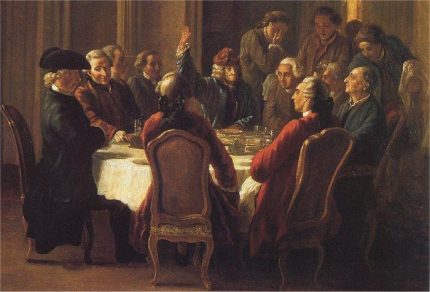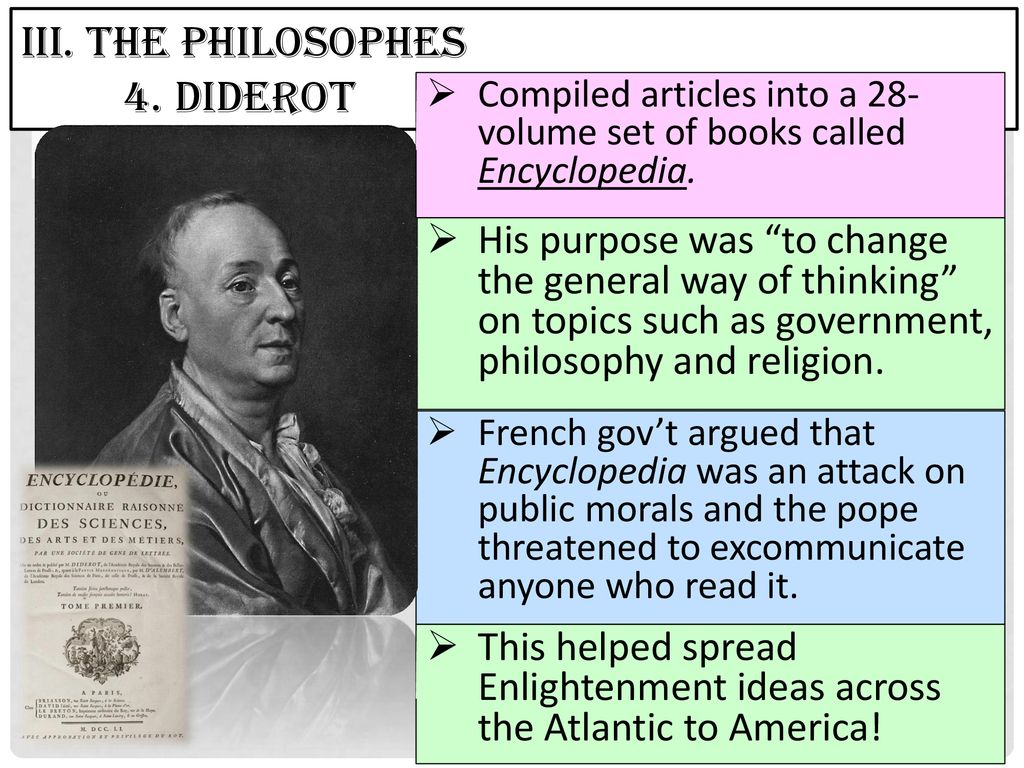Describe the Type of Thinking Used by the Philosophes
In the 1950s Benjamin Bloom developed a classification of thinking skills that is still helpful today. Convergent or analytical thinking divergent thinking critical thinking and creative thinking.
Where historians once believed that the philosophes were the sole carriers of Enlightenment thought they now generally accept that they were merely the vocal tip of a much more widespread intellectual awakening among the middle and upper classes turning them into a new social force.

. Particularly to human institutions such as governments ii. Few were primarily philosophers. The 4 Types of Thinking Skills.
At least one philosopher is. It involves two main types of thinking. The 4 types.
Reason Enlightened thinkers believed truth could be discovered through reason and logical thinking. They were the educated elite of western Europe and they believed in political ideas such as separation of powers and also that a good monarch is key to a great government because human beings are rarely worthy to govern themselves. He lists six types of thinking skills ranked in order of complexity.
Philosophes were secular in thinkingthey used reason and logic rather than faith religion and superstition to answer important questions iii. Major Schools of Thought in Educational Philosophy Philosophies of education have traveled down a tree of different branches with four major schools of thought. Immanuel Kant 17241804 Prussian-born and therefore identified as a German philosopher Kant is considered among the most essential figures in modern philosophy an advocate of reason as the source for morality and a thinker whose ideas continue to permeate ethical epistemological and political debate.
Expressing convictions shared among Enlightenment thinkers of widely divergent doctrines Kant identifies enlightenment with the process of undertaking to think for oneself to employ and rely on ones own intellectual capacities in. Now thinkers wanted to take a similar approach to problems of human life. A European intellectual movement of the late 17th and 18th centuries emphasizing reason and individualism rather than tradition Rationalism a system of thought expounded by René Descartes based on the belief that reason is the chief source of knowledge Philosophe.
Scientists used observation and logic to understand the physical world. They had a critical eye and looked for weaknesses and. Reason thinkers believed truth could be discovered through reason or logical thinking.
Anarchism political philosophy which considers the state undesirable unnecessary and harmful and instead promotes a stateless society or anarchy. Their methods were rapidly overturning old beliefs. The philosophes French for philosophers were the intellectuals of the 18th-century Enlightenment.
There are four types of thinking skills. We use these skills to help us understand the world around us think critically solve problems make logical choices and develop our own values and beliefs. Philosophes were secular in thinking they used reason and logic rather than faith religion and superstition to answer important questions Used reason and logic to determine how governments are formed Tried to figure out what logical rational principles work to tie people to their governments Questioned the divine right of kings.
Political thought in the European Enlightenment fed continuously on this pre-Enlightenment mentality of empirical interrogation of past dogma and theory of rational challenge to authority and tradition of skepticism scientific enquiry increasing secularism and humanitarianism William 7. Enlightenment thinkers in Britain in France and throughout Europe questioned traditional authority and embraced the notion that humanity. Divergent in which one tries to generate a diverse assortment of possible alternative solutions to a problem and convergent in which one tries to narrow down multiple possibilities to find a single best answer to a problem.
Nature they also believed that what was natural was also good and reasonable natural resources. 5 Concepts formed the core of philosophes beliefs. Critical thinking refers to the ability to exercise careful evaluation or judgment in order to determine the authenticity accuracy worth validity or value of something.
Rather philosophes were public intellectuals who applied reason to the study of many areas of learning including philosophy history science politics economics and social issues. When a person decides not to do something like parking in a handicapped space because they will be fined for breaking the law this is called deterrence. Happiness they rejected the medieval notion that people should.
Libertarianism political philosophy that advocates minimization of the government and maximization of individual liberty and political freedom. Multiple-choice tests for example tend to involve convergent thinking whereas essay tests typically engage. These thinkers wanted to forget the teachings of the past because they felt a new age of reason was dawning.
Creative thinking Analytical thinking Critical thinking Concrete thinking Abstract thinking Divergent thinking Convergent thinking The way one person approaches problems and solutions relies more on how the brain manages and processes information rather than the facts presented. Knowledge comprehension application analysis synthesis and evaluation. It is known as Blooms taxonomy.
The philosophes were thinkers who rethought society and politics and presented their ideas to the public. There are seven most common types of thinking. Nature The philosophes also believed that what was natural was also good and.
Realism Existentialism Pragmatism and Idealism. The first philosophy is deterrence this philosophy tries to convince people not to commit crimes or violate laws. Intellectualsphilosophesbegan to ask if natural laws might also apply to human beings i.
In addition to precise objective analysis critical thinking involves synthesis evaluation reflection and reconstruction. Thinks focused on economic reforms looked for natural laws to define a rational economic system rejected Mercantilism make the land more productive laissez faire allowing business to operate with little or no government interference The Wealth of Nations.

Lesson Plans And Student Activities For The Enlightenment And The Scientific Revolution In This Activi Scientific Revolution Enlightenment Enlightenment Ideas

The Philosophes And Their Ideas Ppt Download

10 22 14 Objective Students Will Be Able To Compare And Contrast The Philosophes Of The Enlightenment Do Now What Is A Philosopher Agenda Do Now Powerpoint Ppt Download

The Age Of Enlightenment The Link Between The Scientific Revolution And The Enlightenment Is Scientific Revolution World History Classroom Best History Books

Quick Guide Applying Stoic Ethics In Modern Life Philosophy Ethics Stoic

What Is Philosophy Crash Course Philosophy 1 What Is Philosophy Crash Course Philosophy

French For Philosophers Ppt Download

Aristotle Virtue As The Golden Mean Philosophy Theories Philosophy Ethics

The Philosophes Of 18th Century France

School Of Philosophy Philosophy Quotes Philosophy Theories

The Philosophes And Their Ideas Ppt Download

French For Philosophers Ppt Download

I Made An Infographic Summarizing Different Ethical Theories Ethics Philosophy Make An Infographic

French For Philosophers Ppt Download

French For Philosophers Ppt Download

9 Ways Thinking Like A Philosopher Will Make You Wiser Ladders Educational Psychology Psychology Books What Is Wisdom




Comments
Post a Comment